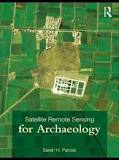 |
| Parcak's book Satellite Remote Sensing for Archaeology |
Moodle Supports Location-based Learning
Moodle is an open source learning management system. I was surprised to learn it has "conditional display based on location," what is called the Moodle GPS Course Format. A Moodle News article from 2014 on the plugin from the German company ka:media describes some applications:
Imagine the ability to hide materials until a student was in proximity to a specific place! Scavenger hunts, virtual tours of cities, geocaching challenges…I can think of a couple of cool ways to use this GPS format. With a responsive or Mobile theme this could be a really awesome and amazing way to bring interactivity to your blended classroom.We can already do those things with existing LBS services, tools and APIs, but this implementation integrates them into learning via an LMS. If I understand correctly, the "Format," first announced in 2013, comes as part of a free set of tools and services from ka:media and as a download from Moodle.org. A version updated for Moodle 3.0 is expected in March. I could not find any documentation of implementations; if you know of any, I'd love to hear about them.
Subscribe!
Get your weekly GIS education update free, via e-mail, every Thursday.
2016 Geospatial Skills Competition
The GeoTech Center announced the 2016 Geospatial Skills Competition. Here are the basics of this year's event for U.S.-based undergraduates over 18 who take a geo-related course during spring semester.
- One round
- Students can use any GIS software
- The product is a poster on a topic of the student's choosing (PowerPoint or maybe other formats) and a short description of the project (250-500 words)
- Up to four individual winners will be given an all expense paid trip (transportation to the meeting, lodging, meals and registration fees) to the Esri User Conference in San Diego
- Materials due Apr 29
Hexagon's IGNITE: Academics Wanted
Hexagon Geospatial announced its IGNITE Smart M.app competition at its conference last year. The first IGNITE event, an introduction and idea exploration for potential participants, was held in New York last week. You may have seen the headline from Xconomy: Hexagon Geospatial Starts Yearlong Hackathon in New York for Map Apps, which made the rounds. The company is taking the events around the world to jumpstart submissions, which are due May 1. There's quite a bit of money involved, including a top prize of $100,000, along with 19 other cash distributions.
While it's not obvious form the marketing materials, Hexagon Geospatial President Mladen Stojic says he's looking to build a grass roots movement and is especially interested in the participation of academics - faculty, researchers and students.
Re-mapping World Religion
University of Redlands Associate Professor of Religion Lillian Larsen, supported by a grant from the Wabash Center for Teaching and Learning in Theology and Religion, and in collaboration with faculty at Redlands will develop curricula that will help students research, reconstruct and, to some degree, re-draw the map of world religion. (library.redlands.edu/redrawmap). Collaborators include the Center for Spatial Studies.
Dr. Sheryl Sorby: Improving Spatial Visualization Skills
Spatial Skills: A Critical Link to Retention in STEM is a 20 minute video presentation (funded via U.S. tax dollars through the National Science Foundation) about the value and teaching of spatial skills. The focus is on engineering (rotating objects) and the value of a spatial skills course. In short, those who take the skills course show better grades in specific classes and overall.
 Videos and resources from Directions Magazine's Drone Flying Free event last week are available. One session focused on drones in education.
Videos and resources from Directions Magazine's Drone Flying Free event last week are available. One session focused on drones in education.Christine Koeller uses Victor and Rasta, two fictional characters, to help students understand the difference between vector and raster data.
USGIF's second annual State of GEOINT Report (pdf) is out. Per the intro webpage, it's a "a series of concise descriptions of problems, achievements, and emerging issues and technologies as a guide to better understand the global GEOINT mission."
Students can now apply for Azevea's Summer of Maps program, a funded 12 week program supporting nonprofit projects.
The GeoTech Center is offering a March 6 event: Drone Law for Geospatial Professionals and Educators Webinar.
California State University, Long Beach (CSULB) is now accepting applications for Fall 2016 to the Masters of Science in Geographic information Science (MSGISci). It's a 1-year program with classes on weeknights and weekends
Geo for All is developing a primary and secondary (K-12) School Network. Current educational resources include GeoAcademy and MapStory.org.
The New England Geography Education Network (NEGEN) has partnered with the National Council For Geographic Education (NCGE). Among other things, it means NEGEN members can join NCGE at a reduced rate of $50 per member/per year (a $45 savings).
Caroline Vakil, a columnist at The Daily Northwestern, argues the university outside Chicago should mandate a geography course for all students.
The University of Illinois has a residence professional science masters (PSM) in GIScience focused on business. There's a webinar on PSMs today 1:00- 2:00 pm CST.
Two of the FOSS4G Academy QGIS Labs now have associated lectures. The lectures are HTML only with PowerPoints coming soon.
Worth Reading
- Exclusive: From AOL Exec to Antarctic Explorer, Meet National Geographic's First Female Chairman - Jean Case, 56 is the wife of AOL co-founder Steve Case, and calls the appointment her "dream job."
